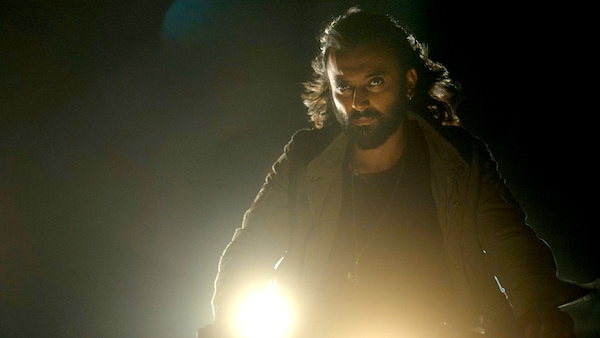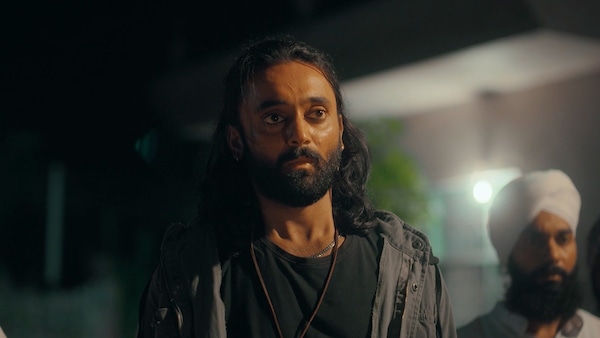You Know When A Show Has Shine. Chamak Has None
This is #CriticalMargin, where Ishita Sengupta gets contemplative over new Hindi films and shows. Here: Chamak.

Last Updated: 05.25 AM, Dec 11, 2023
This column was originally published as part of our newsletter The Daily Show on December 11, 2023. Subscribe here. (We're awesome about not spamming your inbox!)
***
ROHIT JUGRAJ’s Chamak, a sprawling series on the music scene in Punjab, works as a concept. A small-time criminal from Canada flees to India for safety and discovers that he has a past. His parents were famous musicians who were assassinated in broad daylight. This makes for a crowded but potential premise that can outline three distinct realities of the state: the thriving music landscape, the continual arrival and departure of the youth of Punjab to and from abroad, and the shadow of death that hangs over its musicians.
Jugraj takes this and crafts a sluggish 12-episode series (six are available to watch) so ineptly made that it squanders all potential at the altar of promise. The director tries bridging the past and the present while sneaking in social commentary. But he goes forth awkwardly through it, revealing at all times that he has bitten off far more than he can chew. The result is a half-baked show that loses itself in the maze of its creation and later takes amateurish detours to tie loose ends.
Take for instance the ease with which Chamak skips characters and subplots while lunging ahead. The show opens with a man called Kaala (Paramvir Singh Cheema of Tabbar fame) who is let go from jail in Canada. He arrives straight at a girl’s house, has sexwith her, and then realises that she was cheating on him. What follows is him killing the other man and absconding to India with a help from a friend. On arriving, his past opens up — the death of his parents and the mystery surrounding it (this is loosely based on the story of famous folk singers Amar Singh Chamkila and his wife Amarjot Kaur whose deaths remain unsolved).
While the filmmaker gives the impression that Kaala went to India to go underground because cops in Canada are looking for him, as the story unfolds, the writers conveniently forget to factor this in. Thus, Kaala is consumed with rage and he makes (a really scattered) plan of avenging his parents’ death. There are many suspects. His father Tara Singh (Gippy Grewal) had four friends, all of whom outlived him and established a successful business in music. There is Pratap Deol (Manoj Pahwa) who owns a leading music company; Jugal Brar (Savinderpal Vicky), a famous singer but stays away from the limelight; Baldev Dhillon (Hobby Dhaliwal), a politician; and Teja Grewal (Rakesh Bedi), another music producer whose son (Mukesh Chhabra in an unfortunate cameo) handles the business.

Kaala gets sucked into this immediately. It matters not that he has lived away from all this for more than two decades of his life, all the while assuming that his uncle was his father. As soon as the truth about his parents’ death strikes him, he goes through various music labels (Jugraj makes it look as easy as sauntering in an office) and before we know it, he is all over social media. This presence poses no threat at all. I am assuming the cops in Canada are not interested in the internet.
Then there is the sheer number of characters. The winding way the show goes to its revelation is disrupted by the number of characters that exist at all times, making it difficult to follow and impossible to care about. I am assuming the outing is aware of it, and thus almost every episode (of the six) opens with a scene where Kaala stands before a flowchart drawn by him, with the name and picture of the suspects written. The makers are so hell bent on ensuring that we keep up that in the same board there is also a piece of paper stuck that says, “Why was my dad killed?” More often than not, characters who are supposedly important are left behind with no context. Even then the storytelling is so muddled that after watching six hours of the show, I am not entirely sure how many characters are there and how they are related.
There is also no development. Most of the characters are written as traits. Thus, Pratap has three kids. One of them is queer, one of them is philanderous, and the third exists. Beyond this, there is little to no insight available about them. Then there is Jugal Brar’s daughter, Lata (an impressive Akasa Singh). She is also an aspiring singer but Chamak dedicates most of her screentime to depicting the many men she sleeps with.
The series fares no better when it comes to the protagonist. The character is written in a showy way who only angles for external reaction. Every time he hatches a plan he looks at himself in the mirror. Like he wants to see how he looks while making a plan. Much like the show wants us to see everything he feels. Paramvir is a fine actor but he hardly registers a presence here. He plays the character like someone who is clueless about what is happening inside his head, which makes for a more inert performance than a subtle one.
Filled with songs and cameos, Chamak bursts at the seams with the energy of a passion project. The intent is evident: the makers wanted to present a side of Punjab that remains hidden underneath the conversations about drugs. The series seeks to depict an insider perspective on the music industries in the state, the rivalry and camaraderie they share. But what emerges is a dull, dull portrait of a vibrant scene. Granted this is based on the first six episodes, but you know when a show has shine. Chamak has none.
(Disclaimer: The views expressed in this column are those of the author and do not necessarily reflect the official policy or position of OTTplay. The author is solely responsible for any claims arising out of the content of this column.)
